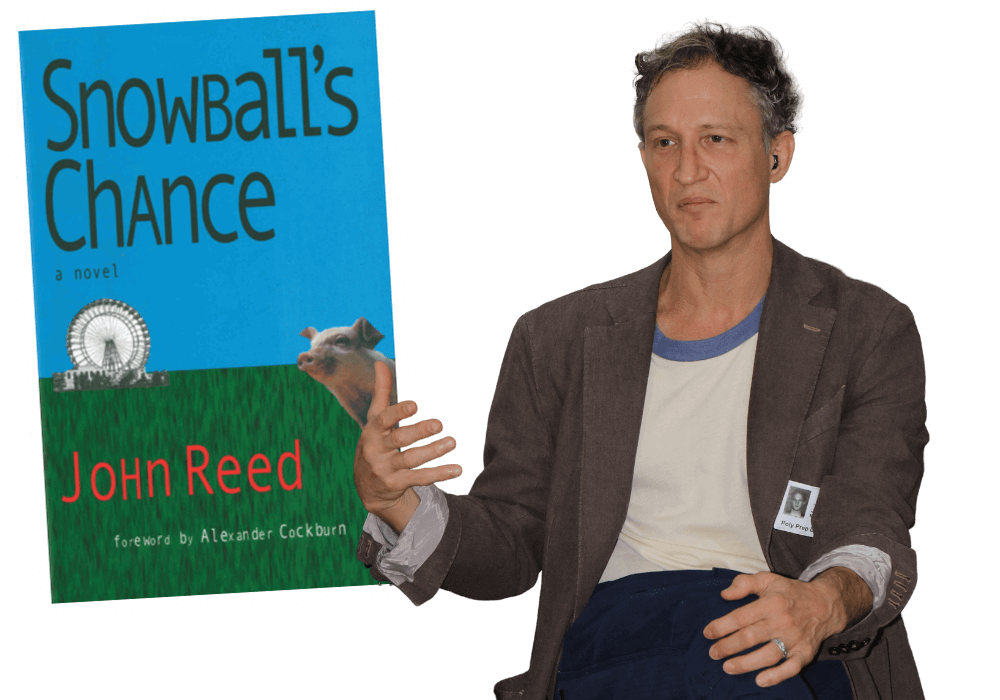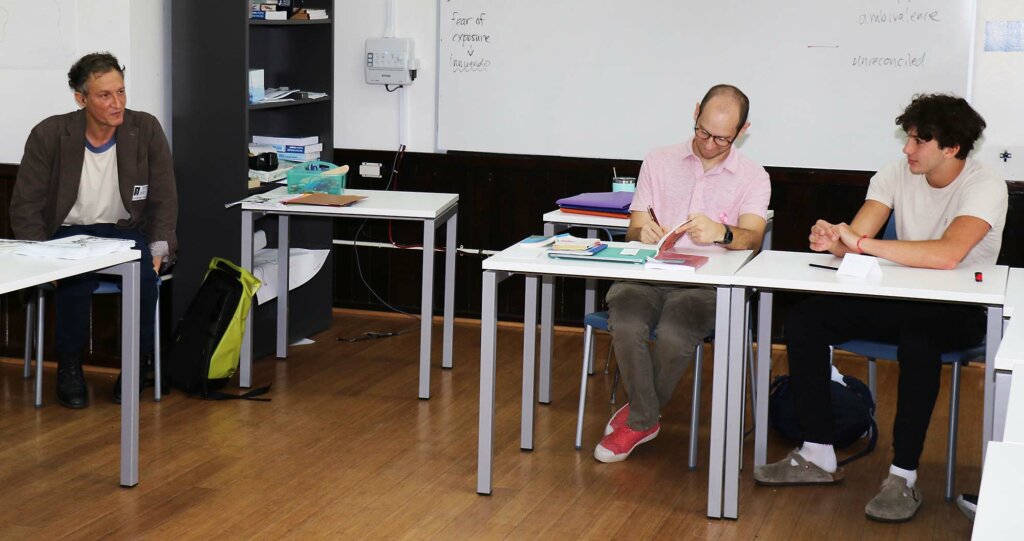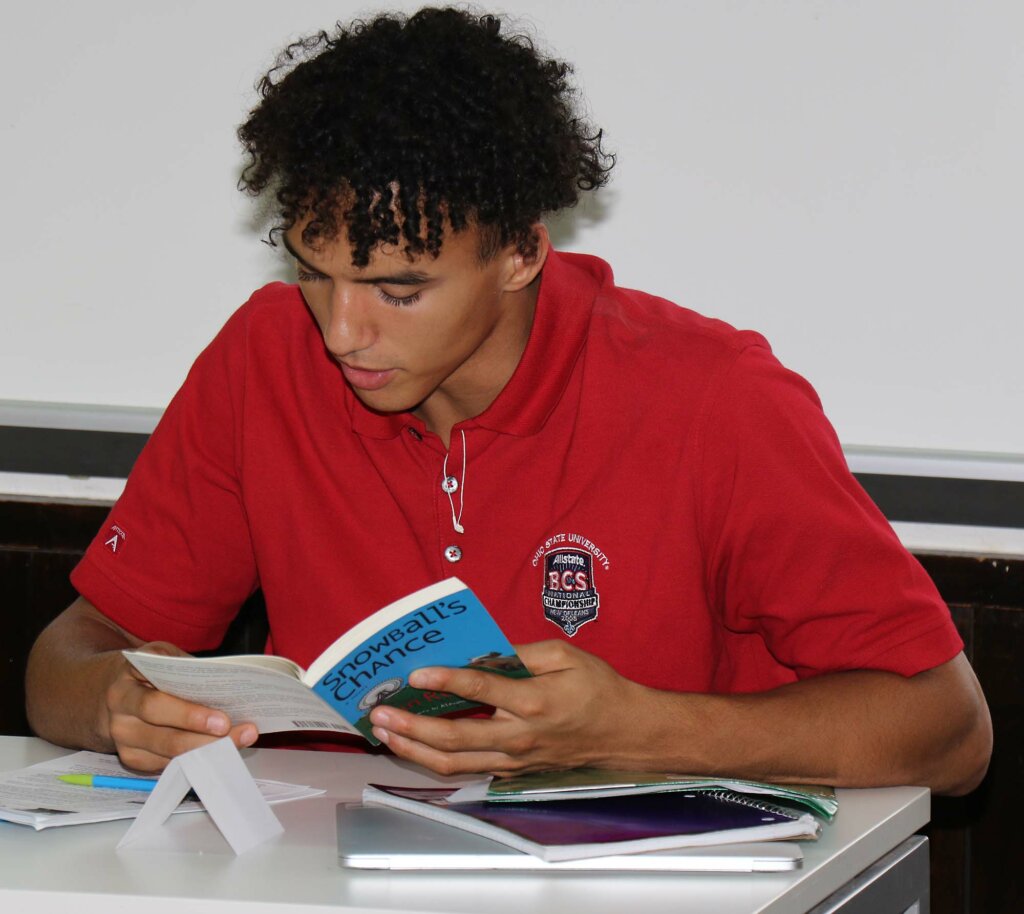News
Author John Reed Visits New English Elective Class

Students in Lee Marcus’ Satire & Society class, a new junior/senior English elective, had the opportunity to converse with novelist John Reed about his book Snowball’s Chance, which the class had read.
Snowball’s Chance
Snowball’s Chance is a parody of George Orwell’s Animal Farm, which Poly students read in Grade 7.
Reed is currently the Director of Creative Writing at the New School. He has been affiliated with several literary publications, including Brooklyn Rail, New York Press, and the literary journal Open City. In 2002, Roof Books published Snowball’s Chance. Marcus explained, “The novella satirizes American democracy and capitalism and critiques Orwell’s central premise,” and added, “John’s collection of essays, The Never End: The Other Orwell, the Cold War, the CIA, and the Origin of Animal Farm, offers further critique of Orwell’s prominence and will be published later this year.”
Satire, Backlash, & Relevance
“It is very unique for students to openly question the author of a book they have read,” said Marcus. “Snowball’s Chance came with lots of controversy. John Reed wrote the book in the weeks following the 9/11 attacks and is a salient critique of the ways our society has become increasingly polarized over time. The book faced lots of backlash when it was published, and students were excited to learn more about the author’s choices and the way the book does and does not hold up to modern society. This is the focus of the class — to consider the relevance and effectiveness of satire — and allowing space for the students to process the novel with the author there to respond to their questions was critical to understanding the way that satire works.”

Critical Response to Snowball
In class, Reed addressed the critical response to Snowball when it was first published in 2002. For example, in a 2002 New York Times review, Dinitia Smith wrote, “Mr. Reed says he is definitely one of those in the anti-Orwell camp. ‘I really wanted to explode that book,’ he said of ‘Animal Farm.’ ‘I wanted to completely undermine it.’”
Smith continued, “Mr. Reed decided to turn Orwell’s classic back on itself. In his parody Napoleon, the Stalinist pig dictator of ‘Animal Farm,’ dies, and his old rival, Snowball, returns transformed into a corporate capitalist dressed in cuff links and a blazer. ‘Tonight, I present an animalage of such erudition that all the wisdom of the village is now ours,’ Snowball says, announcing a new, decidedly free-market credo for the farm: ‘All animals are born equal — what they become is their own affair.’”
“It’s hard to see history while you are in it.”
Reed, who lives in NYC, told students that his book was a response to the 9/11 attacks. “I had the whole thing in my head,” he said, “I just had to type it out.”
Reed said he was “totally surprised” by the strong critical responses including by the late British author and journalist Christopher Hitchens. “But I was also delighted when Orwell lawyers wanted to sue me,” he said. Reed was especially angry about one reviewer who, he said, did not read the book. “She missed the ending,” he said. Reed added that he lost friends because of the book.

Looking back at the criticism, Reed says, “It’s hard to see history while you are in it.”
In a Q&A, students asked how Reed dealt with the criticism and how he developed his characters and he asked them which were their favorite characters in the book.
Takeaways
Afterward, Marcus said, “I took away many things from the conversation, but one piece that stands out is how John Reed framed the role of the engaged citizen: It is about doing what you are good at to make a difference in society. For him, that’s writing, as he’s an expert writer, and it was nice to hear him affirm the various ways that citizens might have an impact on affecting positive change. Unlike what students might have expected, he was more optimistic than cynical about the state of the world.”



